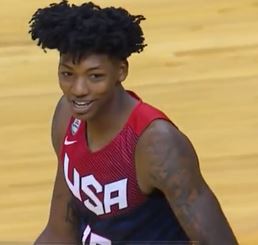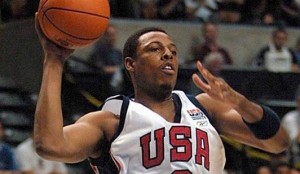 LAS VEGAS — It was a warm, muggy morning in Lafayette, Louisiana on Wednesday as Elfrid Payton was going through his usual daily workout when his cellphone rang. It was his agent, telling him he had been invited to Team USA training camp to help fill out the roster for the end-of-mini-camp exhibition game.
LAS VEGAS — It was a warm, muggy morning in Lafayette, Louisiana on Wednesday as Elfrid Payton was going through his usual daily workout when his cellphone rang. It was his agent, telling him he had been invited to Team USA training camp to help fill out the roster for the end-of-mini-camp exhibition game.
A two-hour drive to New Orleans followed, then a restless night, then a 6 a.m. flight to Las Vegas where a room awaited him at the Wynn Resort. An attempt at a nap proved fruitless, so the 21-year-old dialed up his Orlando Magic teammate, Victor Oladipo, and spent the afternoon catching up as torrential rain fell outside. (Vegas never ceases to surprise).
 A bus ride to the Thomas & Mack Center followed, and by Saturday night Payton was on the court logging 19 minutes of playing time along with three other players — Amir Johnson, Terrence Jones and Arron Afflalo — whose last-minute additions to the scrimmage roster came so last minute that they played wearing jerseys that did not have their names on the backs.
A bus ride to the Thomas & Mack Center followed, and by Saturday night Payton was on the court logging 19 minutes of playing time along with three other players — Amir Johnson, Terrence Jones and Arron Afflalo — whose last-minute additions to the scrimmage roster came so last minute that they played wearing jerseys that did not have their names on the backs.
Johnson, Jones and Afflalo were recruited because they were already in Las Vegas, whereas Payton was the only one who was put aboard an aircraft to make sure enough players — 18 were in uniform — were able to suit up in front of a crowd of 12,211 that was probably expecting at least a LeBron James or a Kevin Durant sighting.
Instead, those players and a majority of the veterans who are expected to comprise Team USA’s Rio Olympics roster sat out or left town beforehand. Of the 34 players who came to Las Vegas early this week for the start of the three-day mini-camp, only 14 suited up for the scrimmage.
And of those 14, it can safely be said that only Kawhi Leonard, Blake Griffin, DeMarcus Cousins and Klay Thompson have a legitimate chance of making the final roster that will be announced at the end of June, 2016.
So Thursday night’s exhibition game was not really a preview of what Team USA will be putting out there a year from now, a team that Jerry Colangelo went on record as saying could be the best the United States has ever fielded.
At his postgame news conference, Colangelo did not specifically say it will be better than the original Dream Team that won gold at the Barcelona Olympics in 1992.
 But he and I had that discussion earlier this week, and Colangelo pointed out that when next summer’s roster is compared, one through 12, with the Barcelona roster, and the Rio roster is going to be deeper. Remember, the Dream Team included Christian Laettner, who barely played, and Larry Bird, who also barely played because he could barely stand up due to a bad back.
But he and I had that discussion earlier this week, and Colangelo pointed out that when next summer’s roster is compared, one through 12, with the Barcelona roster, and the Rio roster is going to be deeper. Remember, the Dream Team included Christian Laettner, who barely played, and Larry Bird, who also barely played because he could barely stand up due to a bad back.
So if this was the start of the road to Rio, it was unusual to say the least that the likes of Payton, Afflalo and Jones were taking part. But it also was a sign of how deep the talent pool is for the American federation, which Payton represented in 2013 at the under-19 World Championship in Prague when the United States defeated Serbia for the gold medal.
The idea that the American federation could place a call to a member of the All-Rookie team, have him drop everything and get on the first flight of the morning to Vegas just to wear the red, white and blue shows just how much of a culture change USA Basketball has gone through since the pre-Colangelo days.
 Back at the turn of the century (yes, I know that makes me sound old) there was a culture surrounding the U.S. team that was the polar opposite. Many of the best players simply did not want to give up their summers to play, and prior to 2002 there was a discernible fear of being a member of the first American team comprised of professional players to lose in a major international tournament. In 2002, it happened three times at the World Championship in Indianapolis, and again in 2004 it happened three times at the Athens Olympics.
Back at the turn of the century (yes, I know that makes me sound old) there was a culture surrounding the U.S. team that was the polar opposite. Many of the best players simply did not want to give up their summers to play, and prior to 2002 there was a discernible fear of being a member of the first American team comprised of professional players to lose in a major international tournament. In 2002, it happened three times at the World Championship in Indianapolis, and again in 2004 it happened three times at the Athens Olympics.
LeBron James told me Wednesday his Athens experience was one of the most frustrating experiences of his life, riding the pine under coach Larry Brown and being buried behind Richard Jefferson and Shawn Marion on the depth chart. James was only added to the roster (along with Carmelo and Dwyane Wade) because of a series of defections from the 2003 U.S. team that triumphed at the Tournament of the Americas in Puerto Rico with a roster that included Jason Kidd, racy McGrady, Jermaine O’Neal, Vince Carter, Ray Allen and Elton Brand — all of whom withdrew from the team over the next 12 months, forcing the Americans to add just about anyone who would say “yes.”
Not to knock Emeka Okafor, but that team was so devoid of depth that Okafor was the 12th man and failed to score a single point in the tournament — a distinction believed to be held by no other player in U.S. men’s Olympic basketball history.
Now, as I mentioned earlier this week in my column predicting the 12-man Rio roster, there is an embarrassment of riches and a culture of camaraderie.
By the time Canada becomes a world power by the 2020 Olympics in Tokyo, the U.S. federation will be well stocked with players itching to get their chance as duplicating the success that James, Anthony, Chris Paul and Kobe Bryant achieved in winning gold medals in Beijing and London.
The Rio Team is going to beg for a new superlative, and Colangelo and coach Mike Krzyzewski know it.
“We have a lot of great players, a lot of great young players in the system, so if everyone stays healthy and we don’t have any injuries, because we’re so deep and so talented this will be the best team we’ve ever put together, potentially,” Colangelo said. “The talent pool is that strong right now going forward, and that’s exciting because we’re going to have a very special team.”
Yes they will.
And as Payton showed with his drop-everything-and-go attitude, that should remain the case for years and years to come.
Chris Sheridan is publisher and editor-in-chief of SheridanHoops.com. He has covered every senior U.S. men’s national team since the 1996 Olympics. Follow him on Twitter.